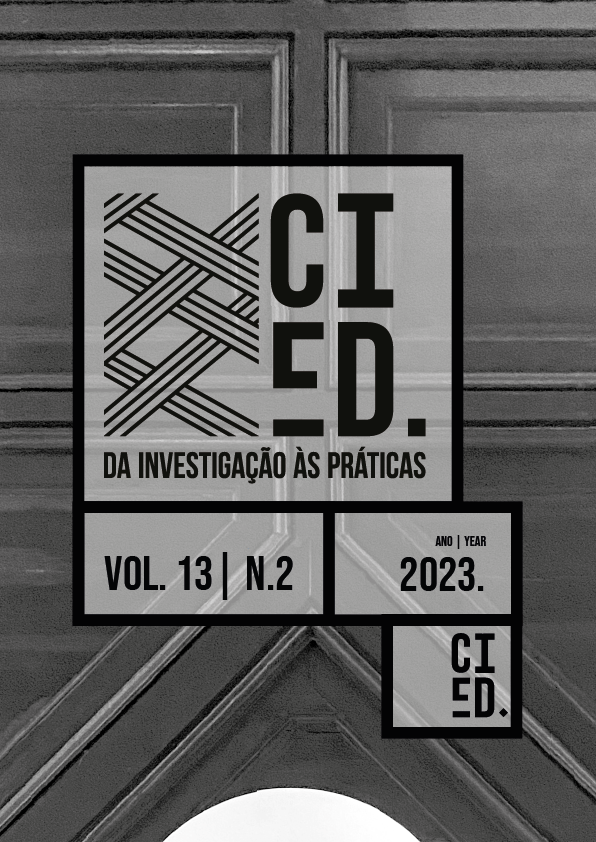Educational intervention projects in the 1st BEC: from problems to problematic
DOI:
https://doi.org/10.25757/invep.v13i2.375Keywords:
Project-Based Method, Problematics, Praxis, Teacher EducationAbstract
Supervised Teaching Practices play a very important role in the study plans of initial teacher education programs at the Escola Superior de Educação de Lisboa. One of the lines that guide professional initiation practices points to the use of Project-based Methods in the design, implementation, and evaluation of intervention projects. Having identified weaknesses in the phase of defining the problematic of intervention projects, which have been outlined in the courses of Supervised Teaching Practice I and II, this article proposes to analyse the students’ performance in defining the problematic they inscribe in their intervention projects. Methodologically, we propose to analyse the 60 intervention projects submitted in the academic year of 2022/2023 within the scope of the two Supervised Teaching Practices of the 1st cycle of education, in the Master’s degree in Teaching of the 1st cycle of education and in Mathematics and Natural Sciences of the 2nd cycle of education and in the Master’s degree in Teaching of the 1st cycle of education and in Portuguese and History and Geography of Portugal of the 2nd cycle of education. Once the different defined problematics have been identified, we proceed to the content analysis, mobilizing the previously explained theoretical references. The results achieved point to the fragile consistency that is registered in the definition of problematics, demanding, from the education institution, a greater commitment in the training process in this matter.
Keywords: Project-Based Method, Problematics, Praxis, Teacher Education.
Downloads
References
Dewey, J. (1938). Logic. The theory of inquiry. Henry Holt and Company.
Dias, A. (2019). Práticas e Conceções da História e da Didática da História na Formação de Professores do Ensino Básico (10-12 Anos). Estudo de caso da Escola Superior de Educação de Lisboa [Tese de doutoramento não publicada]. Universidade Autónoma de Barcelona. imprimirFicheroTesis.do (educacion.gob.es)
Dias, A. (2021). Prática de Ensino Supervisionada em História e Geografia de Portugal no 2.º CEB: perspetiva crítica para a mudança, Da Investigação às Práticas, 11(1), 80-101.
Estrela, A. (2002). Modelos de formação de professores e seus pressupostos conceptuais. Revista de Educação, XI(1), 17-29.
Guerra, I. (2007). Fundamentos e processo de uma sociologia de acção. O planeamento em Ciências Sociais. Principia.
Kant, I. (1781/1994). Crítica da razão pura. Fundação Calouste Gulbenkian.
Leite, T., & Arez, A. (2011). A Formação através de Projetos na Iniciação à Prática Profissional. Da Investigação às Práticas, I(3), 79-99.
Ortega y Gasset, J. (2016). O que é a filosofia? Cotovia.
Schiefer, U., Bal-Döel, L., Batista, A., Döbel, R., Nogueira, J., & Teixeira, P. (2007). Método aplicado de planeamento e avaliação. Manual de Planeamento e avaliação de projectos. Principia.
Serrano, G. (2008). Elaboração de projectos sociais. Casos práticos. Porto Editora.
Tempera, T., & Tinoca, L. (2022). O trabalho de projeto na prática de ensino de futuros professores do ensino básico em Portugal. Revista Práxis Educacional, 18(49), 1-23. https://doi.org/10.22481/praxisedu.v18i49.10072
Downloads
Published
How to Cite
Issue
Section
License
Copyright (c) 2023 Alfredo Gomes Dias, Tiago Tempera

This work is licensed under a Creative Commons Attribution 4.0 International License.
Articles published or submitted to Da Investigação às Práticas are licensed according to Creative Commons Attribution License (CC BY 4.0). Authors agree that:
Copyrights of all articles published are retained by authors with first publication copyright granted to the journal.
All articles are under the Creative Commons Attribution License recognizing the authorship of the publication and identifying that first publication took place in this journal.
Authors have the right to free distribute or make available in private or institutional pages the version published by Da Investigação às Práticas: Estudos de Natureza Educacional provided the original proper citation.
The journal only accepts articles not published previously (except in the form of an abstract or as part of academic thesis), that it is not under consideration for publication elsewhere. After published, the article cannot be published again partial or totally without the editorial board consent.





 e-ISSN: 2182-1372
e-ISSN: 2182-1372